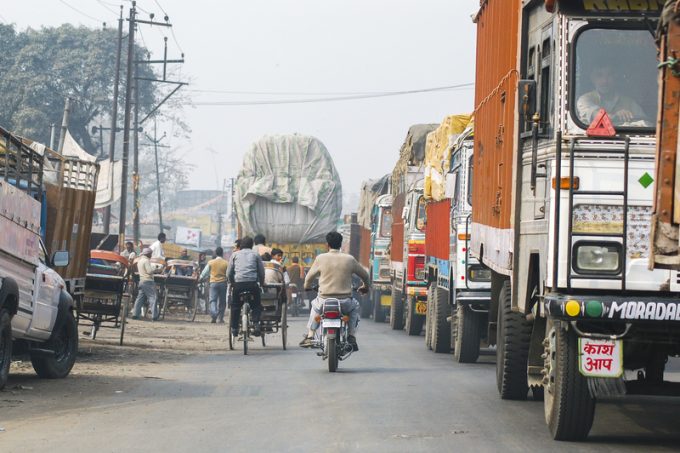Yang Ming to order 13 newbuild box ships for fleet renewal and new markets
Yang Ming today announced plans to acquire 13 containerships ranging in capacity from 8,000 to ...
FDX: ABOUT USPS PRIVATISATIONFDX: CCO VIEWFDX: LOWER GUIDANCE FDX: DISRUPTING AIR FREIGHTFDX: FOCUS ON KEY VERTICALFDX: LTL OUTLOOKGXO: NEW LOW LINE: NEW LOW FDX: INDUSTRIAL WOESFDX: HEALTH CHECKFDX: TRADING UPDATEWMT: GREEN WOESFDX: FREIGHT BREAK-UPFDX: WAITING FOR THE SPINHON: BREAK-UP ALLUREDSV: BREACHING SUPPORTVW: BOLT-ON DEALAMZN: TOP PICK
FDX: ABOUT USPS PRIVATISATIONFDX: CCO VIEWFDX: LOWER GUIDANCE FDX: DISRUPTING AIR FREIGHTFDX: FOCUS ON KEY VERTICALFDX: LTL OUTLOOKGXO: NEW LOW LINE: NEW LOW FDX: INDUSTRIAL WOESFDX: HEALTH CHECKFDX: TRADING UPDATEWMT: GREEN WOESFDX: FREIGHT BREAK-UPFDX: WAITING FOR THE SPINHON: BREAK-UP ALLUREDSV: BREACHING SUPPORTVW: BOLT-ON DEALAMZN: TOP PICK

India’s transport and logistics industry has been left scrambling by Prime Minister Narendra Modi’s sudden and unexpected decision to ban the issue of 500- (US$7) and 1,000-rupee banknotes.
According to the All India Motor Transport Congress, which represents 9.3m truckers, 70% of its members’ vehicles have been forced off the road as operators struggle to pay truck drivers their wages and find the petty cash needed to cover fuel and other costs.
The cash-crunch began after Modi’s shock 8 November announcement that India’s two largest denomination banknotes would be scrapped in a bid to counter corruption, money laundering and the “black economy”.
Three weeks later, businesses and individuals are still struggling to exchange their old bills for new 500- and 2,000-rupee notes.
They have until 30 December before the old notes become obsolete, but withdrawal limits have been imposed at banks and ATMs whilet the government struggles to issue enough new bills. This has resulted in huge queues and a drastic reduction in economic liquidity.
“The logistics industry in India was dependant on daily cash, as most of the drivers don’t have credit or debit cards, nor do villages through which they traverse have banking facilities,” said Janesh Gulati, chief executive of Boxco World Logistics.
He added: “The industry depends on daily bank withdrawals and handing over cash to the drivers for en-route expenses.
“Due to the restriction on daily withdrawals, more than 70% of vehicles are not able to move. This has a huge impact on the transport industry.”
India is one of the most cash-reliant economies in the world; accounting firm PwC estimates 98% of all transactions by volume, and 68% by value, happen in cash.
The demonetisation has had a profound impact on the flow of goods around the country. The wholesale fruit trade, for example, saw an immediate slump with some local news reports suggesting market sales plummeted by as much as 80%.
And, according to the Economic Times, logistics firms operating in India’s booming e-commerce sector reported a 20% drop in volumes for their last-mile deliveries.
Large retailers like Amazon, Flipkart and Snapdeal have either stopped accepting or limited their cash-on-delivery (COD) orders which accounted for 70% of nationwide e-commerce purchases.
Despite the drop in sales, many retailers however are supportive of demonetisation in the long-term, as more online payments could reduce overhead costs and risks associated with COD. Meanwhile, online sales of groceries have shot up as cash-strapped customers utilise digital payments for daily necessities.
Many logistics players are also supportive of Modi’s policy and see it as a way to stamp out corruption in what is a vast and highly fragmented industry.
“Demonetisation will dismantle the widespread corruption in this sector. Managing corruption takes up to 25% of the time of the operators,” said Bertling’s Ms Amin.
Anil Syal, chief executive of Flywheel Logistics, said the impact on his company had been minimal since “all our payments and receipts are online through electronic transfers”.
But he added: “We feel the issue is temporary and over the next four weeks the situation will improve and business will be back to normal.”
One measure that has helped truckers, however, is the suspension of toll road payments.
“In a bid to keep the supply chain uninterrupted, the Union Roads Ministry (URM) has suspended payment of tolls on all national highways and this is being extended on a weekly basis,” said Sharmila Amin, managing director of Bertling Logistics India.
“Had the tolls not been removed, prices would have increased by three-to-four times,” she added.
Furthermore, according to the Bombay Goods Transport Association, truck turnaround times have reduced by one and a half days between Mumbai and Delhi, with the average daily distance covered increased from 250km to 400km.
Comment on this article